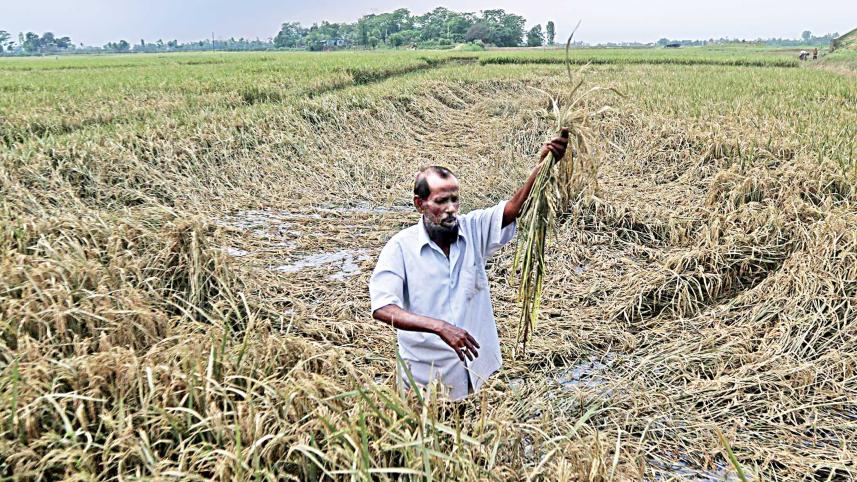Flood in Haor: Time to focus on long-term solutions

Farmers of Sunamganj, Kishoreganj, Netrakona and Sylhet grow Boro on around 4 lakh hectares every year, but the government has been spending money on the vital levees that protect them on a piecemeal basis.
They produce paddy worth over Tk 7,500 crore yearly and the government this year has spent just Tk 159 crore on the levees that save their fields from flash floods.
Experts and activists for years have been saying that it is high time to focus on long-term solutions like river dredging as short-term solutions like constructing levees is not working due to their poor quality.
Zaheed Farooque, state minister for water resources, at a press conference in Dhaka yesterday said a project to dredge 14 rivers in the Sylhet region has been taken up.
However, experts opined that dredging a few rivers at random would not solve the problem. A massive dredging plan followed by a complete study is compulsory for a fruitful outcome.
Flash floods first hit haors on April 1. Boro on over 7,000 hectares have so far been submerged, damaging crop worth about Tk 125 crore.
At least three major levees broke and many more are at risk.
Things could take a turn for worse as it has started raining again in the country's north-eastern region and in India's Meghalaya and Assam.
Flood Forecasting and Warning Centre has forecast flash floods.
AKM Saiful Islam, professor of Buet's Institute of Water and Flood Management, said, "The timespan of flash floods hitting haor areas is advancing which we can relate to the climate change."
"PICs [project implementation committees] must be formed way before the water recedes post-monsoon so that the construction can start and finish early," he said, adding that the dykes' compaction must be done properly.
The professor urged to build up a long-term collaboration with India so that Bangladesh can get information about weather and water level in the rivers upstream.
Ali Muhammad Omar Faruque, director of water resources ministry's Department of Bangladesh Haor and Wetlands Development, said a study was required for long-term steps. "We will be planning a study soon."
Kashmir Reza, president of Haor O Paribesh Unnayan Sangtha, a rights organisation, said, "Rivers upstream must be dredged along with all major rivers downstream so that the excessive water recedes easily."
SM Shahidul Islam, additional chief engineer of BWDB in Sylhet, said, "There is nothing wrong with the compaction of the closures, but the older parts become week over time and break. It needs more budget allocation to construct stronger levees."
State Minister Zaheed yesterday said constructing permanent levees in the haors was not possible.
On the project to dredge 14 rivers in Sylhet region, he said it would increase the capacity of the rivers holding rainwater from upstream.
"We've identified the problems and will start our work in November .. and hopefully there will be no problem next year."




 For all latest news, follow The Daily Star's Google News channel.
For all latest news, follow The Daily Star's Google News channel.
Comments